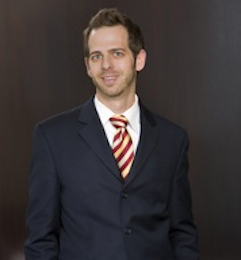LAWYER LIMELIGHT: BENJEMAN L. NICHOLS
By Lawdragon News | October 31, 2014 | Lawyer Limelights - Cavanagh Law Group, Lawyer Limelights
Benjeman L. Nichols of Cavanagh Law Group discusses his practice as a trial lawyer, the challenges he faces in his practice and a civil rights case against the City of Chicago.

Name: Benjeman L. Nichols
Firm: Cavanagh Law Group
Position: Associate
Practice Areas: Plaintiff's Personal Injury, Medical Malpractice, Products Liability, Premises Liability and Wrongful Death
Location: Chicago, Illinois
Lawdragon: Let’s start out with a general overview of your practice. How do you describe to recruits or family what it is you do?
Benjeman L. Nichols: I’m a trial lawyer who specializes in cases where people are hurt, such as medical malpractice, auto accidents, and construction accident.
LD: What do you like about your practice?
BN: I love being able to speak for people who would find it hard to speak for themselves.
LD: What is professionally satisfying?
BN: I enjoy helping people navigate the legal system. Because all of my clients are injured, they often struggle with jobs, doctors, and pain. When I can earn their trust and take over the burden of litigation, they are relieved and can focus on their daily life. It’s rewarding to know that I can help them this way.
LD: What’s the most interesting thing you’ve done as a lawyer?
BN: I flew to almost fifteen hours to Kuwait to depose a witness in one of my cases.
LD: What cases are keeping you busy these days?
BN: I have a civil rights case against the City of Chicago, where we have alleged that the Chicago Police has a code of silence that causes the Police to protect its officers from charges of wrongdoing. The defendant officer in my case had been involved in several questionable collisions, where it appeared that he had been intoxicated, but he was never punished in any way. Then one day he became extremely intoxicated and caused a collision that resulted in my client’s death. We have alleged that the City’s efforts to protect the officer emboldened the officer to feel that he was above the law and that he could drive under the influence of alcohol with impunity.
LD: Can you describe for us their current procedural posture, or resolution?
BN: The case is pending in federal court in the Northern District of Illinois.
LD: What were/are some of the challenges you face? What is the impact on clients or the industry from this case? Are there any trends you are seeing that stand out?
BN: I see medical providers and insurance companies becoming more savvy and trying to strategically bill to maximize the amount of money that they can receive from a settlement or a verdict. There are laws in place that protect plaintiffs from paying all of their settlement or verdict in medical bills, but those laws are in flux at the moment, and I see medical providers and insurance companies trying very hard to get as much of a settlement as possible. We work very hard to maximize the amount of money that our clients can keep.
LD: Is this the type of practice you imagined yourself practicing while in law school?
BN: I actually went into law school with the hope of working for the State Department in the Foreign Service. At the end of my first year, however, I was accepted onto my law school’s mock trial team, and I spent the next two years preparing to be a trial lawyer. I learned that I love litigation and the ability to resolve problems for other people.
LD: Did you have a favorite class or professor that was particularly influential in your studies or future career?
BN: On the mock trial team, we met after class on four nights per week and on weekends. It was grueling and overwhelming, but it was also my most formative and meaningful law school experience. We benefited tremendously from experienced and successful attorneys and judges who donated their time and energy to teach us the skills that they learned.

